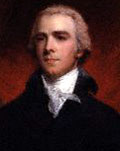- William Grenville, 1st Baron Grenville
Infobox Prime Minister | name= Lord Grenville
small
order=Prime Minister of the United Kingdom
term_start =11 February 1806
term_end =31 March 1807
monarch =George III
predecessor =William Pitt the Younger
successor =The Duke of Portland
birth_date =birth date|1759|10|25|df=y
birth_place =Wotton House ,Buckinghamshire
death_date =death date|1834|1|12|df=y (age 74)
death_place =Burnham, Buckinghamshire
alma_mater =Christ Church, Oxford
party=WhigWilliam Wyndham Grenville, 1st Baron Grenville PC (25 October 1759 – 12 January 1834), was a British Whig
statesman and Prime Minister.Grenville studied at Eton,
Christ Church, Oxford , andLincoln's Inn . The son of Whig Prime MinisterGeorge Grenville and Elizabeth Wyndham, daughter of Tory statesmanSir William Wyndham, 3rd Baronet , he entered the House of Commons in 1782 where his elder brother, Thomas, was already sitting as an MP.Grenville soon became a close ally of the Prime Minister, his cousin
William Pitt the Younger , and served in the government asPaymaster of the Forces from 1784 to 1789. In 1789 he served briefly asSpeaker of the British House of Commons before, he entered the Cabinet asHome Secretary . He became Leader of the House of Lords when he was raised to the peerage the next year as Baron Grenville, of Wotton under Bernewood in the County of Buckingham. The next year, in 1791, he succeeded the Duke of Leeds asSecretary of State for Foreign Affairs . Grenville's decade as Foreign Secretary was a dramatic one, seeing theWars of the French Revolution . During the war, Grenville was the leader of the party that focused on the fighting on the continent as the key to victory, opposing the faction ofHenry Dundas which favored war at sea and in the colonies. Grenville left office with Pitt in 1801 over the issue of Catholic Emancipation.In his years out of office, Grenville became close to the opposition Whigs leader
Charles James Fox , and when Pitt returned to office in 1804, Grenville did not take part. Following Pitt's death in 1806, Grenville became the head of the "Ministry of All the Talents ", a coalition between Grenville's supporters, theFoxite Whigs, and the supporters of former Prime Minister Lord Sidmouth, with Grenville asFirst Lord of the Treasury and Fox as Foreign Secretary as joint leaders. Grenville's cousinWilliam Windham served as Secretary of State for War and the Colonies, and his younger brother,Thomas Grenville , served briefly as First Lord of the Admiralty. The Ministry ultimately accomplished little, failing either to make peace with France or to accomplishCatholic emancipation (the later attempt resulting in the ministry's dismissal in March, 1807). It did have one significant achievement, however, in the abolition of theslave trade in 1807.In the years after the fall of the ministry, Grenville continued in opposition, maintaining his alliance with Lord Grey and the Whigs, criticizing the
Peninsular War and, with Grey, refusing to join Lord Liverpool's government in 1812. In the post-war years, Grenville gradually moved back closer to the Tories, but never again returned to the cabinet. His political career was ended by a stroke in 1823. Grenville also served as Chancellor of theUniversity of Oxford from 1810 until his death in 1834.The Ministry of All the Talents, February 1806 - March 1807
*Lord Grenville -
First Lord of the Treasury andLeader of the House of Lords
*Charles James Fox -Secretary of State for Foreign Affairs andLeader of the House of Commons
*Lord Erskine -Lord Chancellor
*Lord Fitzwilliam -Lord President of the Council
*Lord Sidmouth -Lord Privy Seal
*Lord Spencer -Secretary of State for the Home Department
*William Windham -Secretary of State for War and the Colonies
*Lord Howick -First Lord of the Admiralty
*Lord Henry Petty -Chancellor of the Exchequer
*Lord Moira -Master-General of the Ordnance
*Lord Ellenborough -Chief Justice, King's Bench Changes
*September, 1806 - On Fox's death, Lord Howick succeeds him as Foreign Secretary and Leader of the House of Commons.Thomas Grenville succeeds Howick at the Admiralty. Lord Fitzwilliam becomes Minister without Portfolio, and Lord Sidmouth succeeds him as Lord President. Lord Holland succeeds Sidmouth as Lord Privy Seal.External links
* [http://pm.gov.uk/output/Page160.asp More about William Wyndam Grenville, Lord Grenville] on the Downing Street website.
Wikimedia Foundation. 2010.
